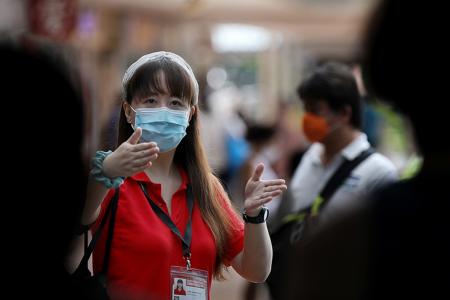Studying impact of virus on Singapore society and behaviour
NCID and universities are studying public perceptions, response, experience of patients
Before the circuit breaker measures were implemented, more than 90 per cent of those with respiratory infections and diarrhoea would seek medical assistance. This has now dropped significantly to under 60 per cent.
This is just one example of the many changes Covid-19 has caused in Singapore. Experts are looking into them to better understand the socio-behavioural impact of the virus.
Researchers will also be conducting interviews and surveys with patients and key population groups about how to improve support and help people seek medical care.
Experts stressed that while the medical and physical implications of the virus have already been acutely felt, the behavioural impact can also be critical.
National Centre for Infectious Diseases (NCID) executive director Leo Yee Sin said that while it is important to study the impact of the disease on an individual, it is of equal or greater importance to examine how this individual can impact the broader community.
To this end, NCID, the National University of Singapore (NUS) Saw Swee Hock School of Public Health and the Nanyang Technological University (NTU) Wee Kim Wee School of Communication and Information are working on four studies focusing on how the Covid-19 outbreak is shaping and being shaped by social and behavioural factors in the population.
The studies will examine public perceptions about the virus and the public's response to interventions by the health authorities, the influence of mainstream and social media on public preparedness during a pandemic as well as the correlation between mitigation methods and social cohesion.
NCID and the Saw Swee Hock school are also conducting a qualitative study on the experience of confirmed patients to better understand ways of reducing the distress felt by isolated inpatients and improving service delivery.
They are also studying how people have experienced quarantine.
But these studies face specific challenges.
NCID's head of research Mark Chen said one of the challenges is getting all the information needed for the survey from those who are not digitally savvy, such as the elderly.
Because of this, the researchers intend to resume door-to-door and in-person recruitment when the situation allows for it again, he said.
Professor Leo said: "The Covid-19 pandemic caused by Sars-CoV-2, with its unique transmission patterns and wide geographical distribution, is here to stay.
"Understanding how the public perceives and behaves during an outbreak and afterwards is a critical component of designing effective prevention strategies, allowing for better community engagement and building greater resilience."
Wee Kim Wee school chair Charles Salmon echoed this sentiment, saying: "This timely partnership between NCID, NUS and NTU can help us answer this question and better understand Singaporeans' reactions to the coronavirus on a near real-time basis."
Get The New Paper on your phone with the free TNP app. Download from the Apple App Store or Google Play Store now



